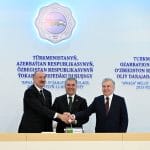Russia’s oil exports to China were almost unaffected last month amid the coronavirus outbreak as the East Asian country has been benefiting from lower oil prices and building its strategic oil reserves, Chris Weafer, founder of Macro-Advisory in Moscow, told New Europe on 4 March.
“You would expect the effects might come later because a lot of the oil going to the East Siberia-Pacific Oil Pipeline, the ESPO pipeline, goes anyway into storage in China, fulfilling the long-term contracts. As the storage capacity in China perhaps grows or reaches capacity, then we are likely to see a slowdown in deliveries, delayed deliveries. For now, what I have been hearing is that China is just taking the oil into storage,” Weafer said, adding the China has plenty of storage and the Chinese have been taking advantage of the lower oil price and building up their long-term strategic oil reserves. “So, in that sense they do have the capacity to take extra oil and to build up their long-term storage whereas with gas, they don’t have the means to store the LNG (liquified natural gas) and therefore they are cancelling contracts and turning LNG tankers away or making them wait,” Weafer said.
The Macro-Advisory expert noted that the price of gas has come crashing down because of the coronavirus but also because gas producers were already suffering due to the climate in Europe in particular but in North America as well which saw greatly reduced demand for gas and rising supply in terms of LNG this winter. “Global prices were already weak and now they are hit hard by the virus effect,” he said.
As the coronavirus outbreak and lower demand has led to lower oil prices, the Organization of Petroleum Exporting Countries (OPEC) and non-OPEC members led by Russia, sometimes referred to as OPEC+, were expected to meet on 5-6 March to discuss further production cuts.
Russia has sent mixed signals to OPEC on the possibility of further oil production cuts. Russian President Vladimir Putin said on 1 March that Russia can cope with the recent decline in oil prices but said Russia will cooperate with OPEC+ to balance the oil market. “I want to stress that for the Russian budget, for our economy, the current oil prices level is acceptable,” Reuters quoted Putin as telling a meeting with Russian energy officials and producers.
Weafer noted that Russia can withstand lower oil prices more than oil producers in the Gulf. “This time around, Russia is in a completely different situation than it was in 2008-09 and 2014 and the difference now is the ruble is completely flexible and the ruble is allowed to free float and that acts as a counterbalance or compensating factor that we did not have before. So, at the current exchange rate the Russian budget should balance at approximately 47 dollars,” he told New Europe. “In many ways, I don’t want to be naïve about it but Russia is in stronger financial position today to withstand this period lower price is a direct result of having to deal with western sanctions,” Weafer said. “If Russia did not have to deal with western sanctions and did not take the actions it was forced because of sanctions it would be in a much more difficult position today,” he added.
Nevertheless, the Moscow based expert stressed that the Kremlin would certainly want to cooperate with the Saudis. “The relationship between obviously Russia and Saudi Arabia, the gulf Arab countries, has become very important in recent years so I think at a political level they will certainly want to cooperate and they would like to be seen to do it. So, I would imagine that Russia certainly will be looking to work with OPEC and to participate in the deal but there is enormous reluctance amongst the oil companies, particularly, of course, Rosneft,” he said.
He explained that the attitude of the Russian oil producers is that the OPEC+ deals which support oil price are only helping to sustain the American oil industry because they don’t participate with any cuts and high price suits them and allows them to increase their global market share. “There is this resentment that what Russia and OPEC are doing has really benefited the US market producers who are competing and taking market share away,” Weafer said, adding: “My guess is that will get statements of cooperation but I would imagine Russia will cut relatively little in terms of production.”
follow on twitter @energyinsider







